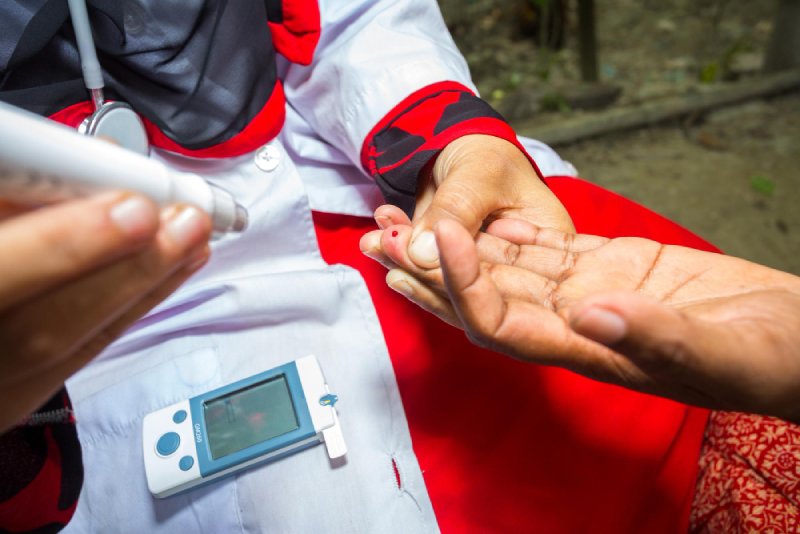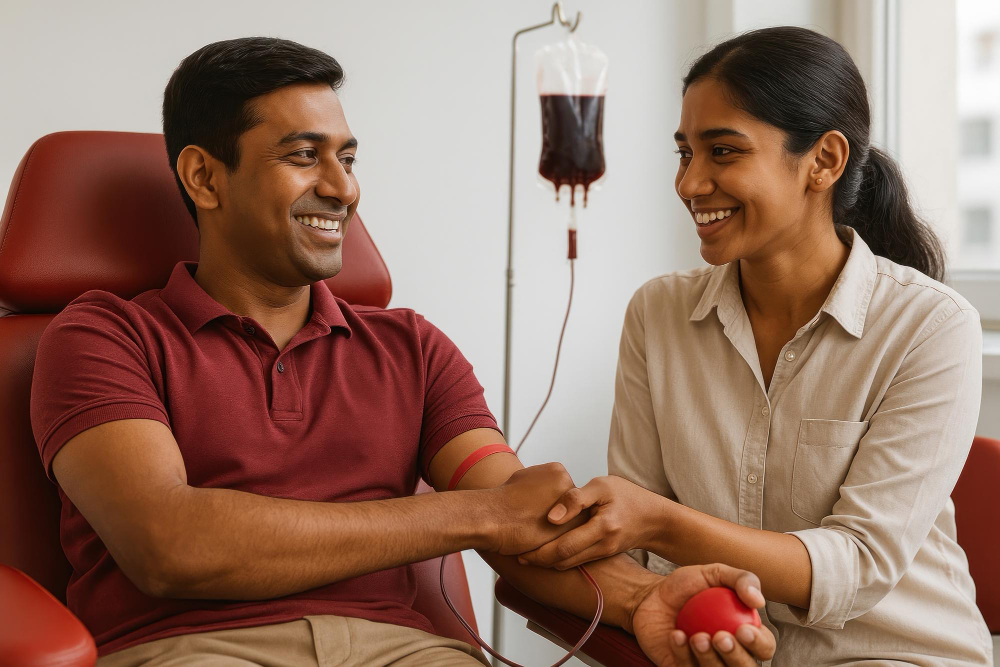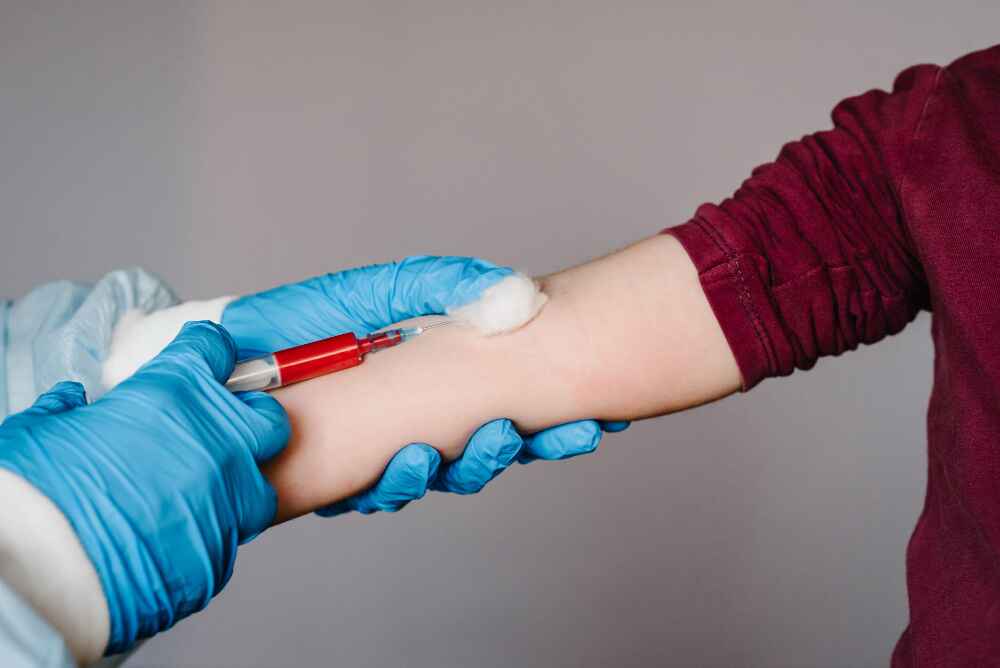Book on Whatsapp
9892101616
Why are people required to fast before a blood test?
Blood Test
Mon Dec 04 2023
Fasting Required for Blood Test
People are typically required to fast before a blood test to ensure accurate and reliable results. Fasting means abstaining from consuming any food or beverages, except for water, for a specified period of time before the blood test.
There are several reasons why fasting is important for certain blood tests:
1. Accurate measurement of blood glucose: Fasting allows for the accurate assessment of blood glucose levels. If you consume food or beverages before the test, especially those rich in carbohydrates, it can cause a temporary rise in blood glucose levels, which may not accurately reflect your normal fasting levels. Fasting helps in diagnosing conditions like diabetes or monitoring glucose control in existing diabetic patients.
2. Lipid profile Test: Fasting is necessary for accurate measurement of cholesterol and triglyceride levels in the blood. When you consume food, especially fatty or high-calorie meals, it can temporarily increase the levels of these lipids in your blood, potentially leading to inaccurate results.
3. Impact on other blood parameters: Some blood tests, such as liver function tests or certain hormonal assessments, may require fasting to avoid interference from recent food intake. Certain substances like fats, proteins, or medications found in food can influence the levels of specific blood markers, making it difficult to interpret the results accurately.
It's important to note that not all blood tests require fasting. Your healthcare provider will inform you if fasting is necessary for the specific blood test they are ordering. Always follow the specific instructions provided by your healthcare professional regarding fasting requirements before your blood test.
In addition to the reasons mentioned earlier, fasting before a blood test is also important to minimize the risk of digestive system interference. When you consume food, it triggers the release of various enzymes, hormones, and chemicals in your body to aid digestion. These substances can temporarily alter the composition of your blood, potentially affecting the accuracy of certain blood test results.
Moreover, fasting helps to standardize the conditions under which blood samples are collected. By establishing a consistent baseline, healthcare professionals can compare results more accurately over time and make more informed decisions about your health.
The duration of fasting required before a blood test can vary depending on the specific test being conducted. Commonly, fasting for 8-12 hours is recommended, which typically means not eating or drinking anything (other than water) from the night before the test until blood is drawn the next morning.
It's worth mentioning that fasting may not be suitable or necessary for everyone. For instance, individuals with certain medical conditions, such as diabetes, may have specific fasting instructions tailored to their needs. Always follow the guidance provided by your healthcare provider to ensure accurate and reliable results from your blood test.
It is also important to stay well-hydrated by drinking water during the fasting period, as dehydration can impact blood volume and potentially affect the results. However, it's usually advised to avoid any other liquids, such as coffee, tea, or sugary beverages, as they may interfere with the accuracy of the blood test.
If you are unsure about the fasting requirements for a specific blood test, it is advisable to consult your healthcare provider or the laboratory conducting the test for clarification. They can provide you with the necessary instructions to prepare for the blood test and ensure the most accurate results possible.
Manipal TRUtest offers a wide range of diagnostic services with assured quality, accuracy, and trust backed by 70 years of Manipal legacy. You can easily schedule a blood test through our WhatsApp Chatbot, Mobile App, or Website. We also provide the convenience of a Home Sample Collection, where a highly qualified phlebotomist will visit you in the comfort of your own home.
OUR PRESENCE
Blood Test Centre in India
Blood Test Center in Hyderabad / Blood Test Center in Kolkata / Blood Test Center in Vizag / Blood Test Center in Mumbai / Blood Test Center in Ghatkopar / Blood Test Center in Kolhapur / Blood Test Center in Pune / Blood Test Center in Solapur / Blood Test Center in Rohtak / Blood Test Center in Indore / Blood Test Center in Gurugram / Blood Test Center in Ghaziabad/ Blood Test Center in Bangalore / Blood Test Center in Nashik / Blood Test Center in Nagpur
CT-Scan Centres in India
CT Scan Centre in Bhiwani/ CT Scan Centre in Gurugram/ CT Scan Centre in Jind / CT Scan Centre in Hisar/ CT Scan Centre in Kaithal/ CT Scan Centre in Kurukshetra / CT Scan Centre in Mewat/ CT Scan Centre in Sonipat/ CT Scan Centre in Panchkula/ CT Scan Centre in Panipat / CT Scan Centre in Rohtak/ CT Scan Centre in Yamunanagar/ CT Scan Centre in Daltonganj / CT Scan Centre in Deoghar/ CT Scan Centre in Dhanbad / CT Scan Centre in Dumka/ CT Scan Centre in Hazaribagh/ CT Scan Centre in Koderma/ CT Scan Centre in Ranchi/ CT Scan Centre in Simdega/ CT Scan Centre in Bangalore/ CT Scan Centre in Mangaluru / CT Scan Centre in Manipal / CT Scan Centre in Ghatkopar
PET-CT Scan Centres in India
PET- CT Scan Centre in Vijayawada / PET-CT Scan Centre in Manipal / PET-CT Scan Centre in Jaipur / PET-CT Scan Centre in Kanchipuram / PET-CT Scan Centre in Goa
Ultrasound Centres in India
Ultrasound Scan in Deoghar / Ultrasound Scan in Dumka / Ultrasound Scan in Bokaro Steel City / Ultrasound Scan in Chaibasa / Ultrasound Scan in Giridih / Ultrasound Scan in Godda / Ultrasound Scan in Gumla / Ultrasound Scan in Khunti /Ultrasound Scan in Jamtara / Ultrasound Scan in Pakur / Ultrasound Scan in Simdega / Ultrasound Scan in Manipal / Ultrasound Scan in Ghatkopar East / Ultrasound Scan in Garhwa / Ultrasound Scan in Jamshedpur
MRI Scan Centres in India
MRI Scan in Bhiwani / MRI Scan in Gurugram / MRI Scan in Hisar / MRI Scan in Mewat / MRI Scan in Panchkula / MRI Scan in Rohtak / MRI Scan in Sonipat / MRI Scan in Ranchi / MRI Scan in Bangalore / MRI Scan in Bhubaneswar / MRI Scan in Cuttack
X-Ray Centres in India
X-Ray Centres in Chaibasa / X-Ray Centres in Chatra / X-Ray Centres in Deoghar / X-Ray Centres in Dumka / X-Ray Centres in Garhwa / X-Ray Centres in Giridih / X-Ray Centres in Godda / X-Ray Centres in Gumla / X-Ray Centres in Jamshedpur / X-Ray Centres in Jamtara / X-Ray Centres in Khunti / X-Ray Centres in Latehar / X-Ray Centres in Pakur / X-Ray Centres in Ramgarh / X-Ray Centres in Sahibganj / X-Ray Centres in Simdega / X-Ray Centres in Ghatkopar
ECG Centres in India
ECG Test in Bokaro Steel City / ECG Test in Chatra / ECG Test in Deoghar / ECG Test in Dumka / ECG Test in Garhwa / ECG Test in Giridih / ECG Test in Gumla / ECG Test in Jamshedpur / ECG Test in Jamtara / ECG Test in Khunti / ECG Test in Ramgarh / ECG Test in Simdega / ECG Test in Ghatkopar
Related Blogs

Blood Test
Cholesterol Levels and What a Lipid Test Reveals
Cholesterol is a waxy, fat-like substance found in every cell of the human body. While it is essential for producing hormones, vitamin D, and substances that aid digestion, an excess of cholesterol in the bloodstream can pose serious health risks. Understanding your cholesterol levels through a lipid test is a crucial step in preventing heart disease, stroke, and other cardiovascular issues.
What Is Cholesterol?
Cholesterol is categorized into two main types: Low-Density Lipoprotein (LDL), often referred to as "bad" cholesterol, and High-Density Lipoprotein (HDL), known as "good" cholesterol. LDL carries cholesterol to your arteries, where it can build up and form plaques, narrowing the arteries and increasing the risk of heart attack and stroke. HDL, on the other hand, helps remove cholesterol from the bloodstream, transporting it back to the liver for excretion.
Another important component is Triglycerides, which are a type of fat found in your blood. When you eat more calories than your body needs, especially from sugar and fat, the excess is converted into triglycerides. High triglyceride levels, along with elevated LDL and low HDL, are linked to an increased risk of cardiovascular disease.
What Is a Lipid Test?
A lipid test, also known as a lipid profile or lipid panel, is a simple blood test that measures the levels of different fats in your blood. Typically, the test includes:
- Total Cholesterol: The overall amount of cholesterol in your blood.
- LDL Cholesterol: Often labelled as “bad” cholesterol because high levels can lead to plaque buildup.
- HDL Cholesterol: Known as “good” cholesterol as it helps remove LDL from the arteries.
- Triglycerides: Elevated levels can raise your risk of heart disease and may indicate metabolic syndrome or diabetes.
The test is usually performed after fasting for 9 to 12 hours, as food intake can temporarily influence lipid levels. Based on the results, your healthcare provider can assess your risk of cardiovascular disease and suggest lifestyle changes or medications if necessary.
Interpreting the Results
Normal lipid levels are typically defined as:
- Total Cholesterol: Less than 200 mg/dL
- LDL Cholesterol: Less than 100 mg/dL
- HDL Cholesterol: 60 mg/dL or higher (considered protective)
- Triglycerides: Less than 150 mg/dL
Borderline or high readings may signal the need for dietary adjustments, increased physical activity, weight management, or in some cases, medication like statins.
Importance of Regular Testing
Regular lipid testing is especially important for individuals over 40, those with a family history of heart disease, people with diabetes, obesity, or a sedentary lifestyle. Early detection of abnormal cholesterol levels can help you take proactive measures to protect your heart and overall health.
Monitoring cholesterol levels through a lipid profile test is a simple yet powerful tool in maintaining cardiovascular health. It offers valuable insights into your risk profile and can guide lifestyle modifications or medical interventions. By keeping cholesterol levels in check, you can significantly reduce your risk of heart disease and lead a healthier, longer life. Regular screening, a balanced diet, regular exercise, and stress management are key to keeping your heart strong and your cholesterol within a healthy range.
Take control of your heart health - test early, stay healthy.

Blood Test
Health Benefits of Blood Donation You Should Know
You may have seen health camps encouraging men and women of eligible ages to donate blood at least once a year. But have you ever wondered—is blood donation actually good for your health?
The answer is a resounding yes.
However, the primary motive of donating blood is to help someone in need, provide them a second chance at life. It is also surprisingly beneficial for the donor. From improving heart health to giving your body a gentle detox, regular blood donation is a simple act that offers powerful returns.
Benefits of blood donation
1. Natural cleanser: Donating blood acts as a natural body cleanser. It affects perfluoroalkyl levels and those of polyfluoroalkyl substances. It reduces skin-related disorders and encourages blood flow. It reduces acne and skin problems.
2. Improves cardiovascular health: Donating blood reduces the chances of cardiovascular issues and heart attacks. It reduces haemoglobin and iron amounts in the body, and blood pressure, and improves blood circulation.
3. Free health check-up: While donating blood at a health camp, you enjoy receiving free health checkups. Healthcare professionals understand your health vitals before the procedure. They test blood pressure and haemoglobin levels. You don’t have to pay for these checkups.
4. Promotes hair growth: After donation, the body produces new blood cells. It stimulates hair follicles while boosting new hair growth.
5. Screening infections and diseases: Health professionals screen your body to identify infectious diseases. It is a mandatory step. They test blood for a variety of diseases, including HIV, virus, malaria, etc.
6. Save lives: By donating blood, you get the opportunity to save precious lives. It includes cancer patients and those suffering from burns or traumatic injuries. You obtain their blessings.
What to do and avoid before and after blood donation?
- Have iron-rich food: Avoid fatty, unhealthy meals. They promote new blood cells.
- Pain relievers or blood thinners: Avoid them before donating blood.
- Get sufficient sleep: Take rest before donating blood. Be relaxed and avoid panic on blood donation day.
- Avoid drinking and smoking: Practice this at least two days before donating blood, as it could increase blood pressure. Moreover, it might reduce the amount in the blood.
- Avoid straining yourself: Performing rigorous exercises after donating blood should be avoided. Do not consume alcohol, smoke, or drugs for a day.
- Rest: After donating blood, A healthcare professional will supervise you. Do not lift heavy weights or perform strenuous physical activities for about hours.
Enjoy the selfless deed!

Blood Test
5 Routine Blood Tests That Help Detect Health Issues Early
Monitoring your health routinely with blood tests is one of the simplest ways to identify an issue before it becomes serious. Blood tests are helpful in providing valuable information about your body's function and can reveal areas of concern. If you're habitual in your routine check-ups, you can effectively make decisions that will benefit your health down the road.
Here are five blood tests worth noting that can help highlight health issues early on.
1. Complete Blood Count (CBC)
A Complete Blood Count, or CBC, is a standard test that looks at several components of your blood, such as red blood cells, white blood cells, and platelets. It can reveal infections, anemia, immune system disorders, and blood cancers.
Even if you feel fine, some health care providers suggest having a CBC once a year because it is part of a regular health screening. Diagnostic centers you trust, like manipaltrutest.com, offer fast, accurate, and high quality CBC tests to help you to be proactive about your health risks.
2. Blood Sugar Test
Elevated blood glucose can lead to diabetes, which can eventually lead to heart, kidney, eye, and nerve damage if lost to detection. For example, a simple fasting blood sugar test or HbA1c test provides a picture of your blood sugar control through time.
Preventing long-term complications is possible if you are diagnosed early with a blood sugar test. It will allow you to make lifestyle changes or take treatment when necessary to lower your blood sugar. If you have a family history of diabetes, then it is even more important to have your blood sugars tested regularly.
3. Lipid Profile
A lipid profile measures the levels of cholesterol and triglycerides in your blood. High cholesterol is a major risk factor for heart disease and stroke. This test checks your total cholesterol, good (HDL) cholesterol, bad (LDL) cholesterol, and triglycerides.
With early detection, you can take action by adjusting your diet, exercising more, or taking prescribed medications. Health centers offer complete lipid profile tests with clear reports and expert guidance.
4. Liver Function Test (LFT)
The liver is an important organ needed for digesting food, storing energy, and removing toxins. A Liver Function Test (LFT) will check for enzymes and proteins that can indicate how well your liver is functioning. Abnormal test results can indicate infections such as hepatitis, liver damage from alcohol or other underlying medical conditions. A regular LFT is critical, as often liver problems do not manifest any symptoms in their early stages. Regardless of whether or not you feel any pain, having your liver function checked now and again gives you peace of mind and could save your life. For peace of mind, consider having this test done once a year.
5.Thyroid Function Test
The thyroid controls your metabolism, energy, among other functions in the body. A Thyroid Function Test examines hormone levels such as T3, T4, and TSH to determine if your thyroid is underactive (hypothyroidism) or overactive (hyperthyroidism). Symptoms such as exhaustion, mysterious weight gains or losses, or mood changes could indicate a thyroid issue. Testing your thyroid health sooner rather than later allows you the opportunity to address and prevent complications that hinder your health and wellness.
Testing services such as Manipal TRUtest gives you the peace of mind of knowing that an reputable provider will have your results into the system quickly and efficiently, so you can continue to monitor your health.
Routine blood tests represent more than measurement of numbers on a report, they give a clearer picture of what is happening inside your body. Identifying health problems at the early stages can empower you with choices for your treatment; putting you in control and giving you a better chance of a longer healthier life.
When you choose to make routine health screenings a regular feature of your health through initiatives such as manipaltrutest.com, you are taking a step towards your health and a better future with less worry.
